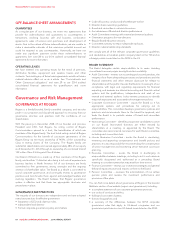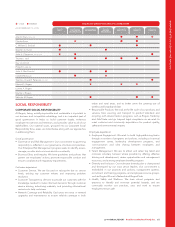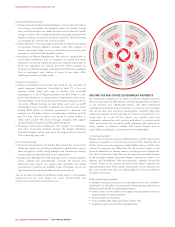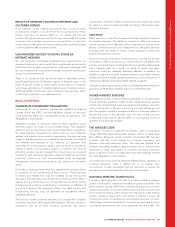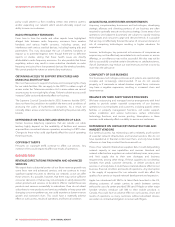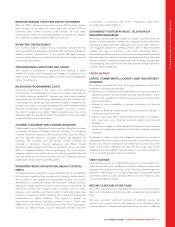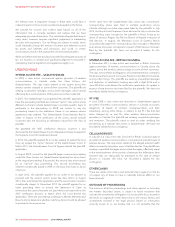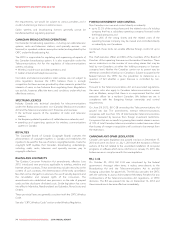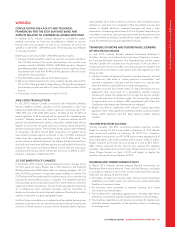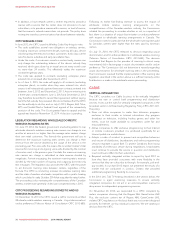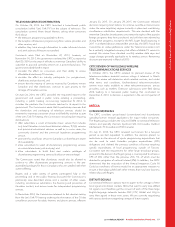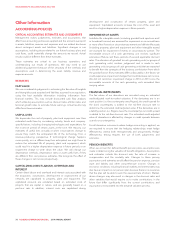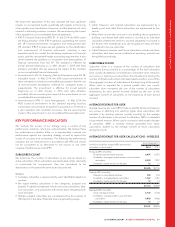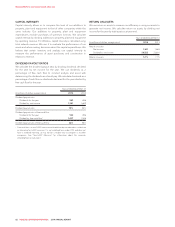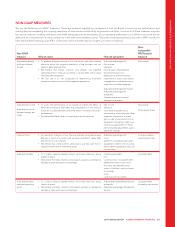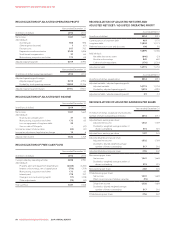Rogers 2014 Annual Report Download - page 78
Download and view the complete annual report
Please find page 78 of the 2014 Rogers annual report below. You can navigate through the pages in the report by either clicking on the pages listed below, or by using the keyword search tool below to find specific information within the annual report.MANAGEMENT’S DISCUSSION AND ANALYSIS
the requirements, we would be subject to various penalties and it
could include losing a licence in extreme cases.
Cable, wireless and broadcasting licences generally cannot be
transferred without regulatory approval.
CANADIAN BROADCASTING OPERATIONS
Our Canadian broadcasting operations – including our cable television
systems, radio and television stations, and specialty services – are
licenced (or operated under an exemption order) and regulated by the
CRTC under the Broadcasting Act.
The CRTC is responsible for regulating and supervising all aspects of
the Canadian broadcasting system. It is also responsible under the
Telecommunications Act for the regulation of telecommunications
carriers, including:
• Wireless’ mobile voice and data operations; and
• Cable’s Internet and telephone services.
Our cable and telecommunications retail services are not subject to
price regulation, because the CRTC believes there is enough
competition for these services provided by other carriers to protect the
interests of users, so has forborne from regulating them. Regulations
can and do, however, affect the terms and conditions under which we
offer these services.
SPECTRUM LICENCES
Industry Canada sets technical standards for telecommunications
under the Radiocommunication Act (Canada) (Radiocommunication
Act) and the Telecommunications Act. It licences and oversees:
• the technical aspects of the operation of radio and television
stations;
• the frequency-related operations of cable television networks; and
• awarding and supervising spectrum for wireless communications
systems in Canada.
ROYALTIES
The Copyright Board of Canada (Copyright Board) oversees the
administration of copyright royalties in Canada and establishes the
royalties to be paid for the use of certain copyrighted works. It sets the
copyright tariff royalties that Canadian broadcasting undertakings,
including cable, radio, television and specialty services, pay to
copyright collectives.
BILLING AND CONTRACTS
The Quebec Consumer Protection Act amendments, effective June
2010, introduced new provisions applicable to wireless, wireline and
Internet service contracts. These amendments include new rules on the
content of such contracts, the determination of the early cancellation
fees that can be charged to customers, the use of security deposits and
the cancellation and renewal rights of the consumers. The
amendments also established new provisions on the sale of prepaid
cards and the disclosure of related costs. Similar legislation has come
into effect in Manitoba, Newfoundland and Labrador, Nova Scotia and
Ontario.
These provincial laws are generally consistent with the CRTC Wireless
Code.
See also “CRTC Wireless Code” section under Wireless Regulation.
FOREIGN OWNERSHIP AND CONTROL
Non-Canadians can own and control directly or indirectly:
• up to 33.3% of the voting shares and the related votes of a holding
company that has a subsidiary operating company licenced under
the Broadcasting Act, and
• up to 20% of the voting shares and the related votes of the
operating licensee company may be owned and controlled directly
or indirectly by non-Canadians.
Combined, these limits can enable effective foreign control of up to
46.7%.
The chief executive officer and 80% of the members of the Board of
Directors of the operating licenseemustberesidentCanadians.There
are no restrictions on the number of non-voting shares that may be
held by non-Canadians at either the holding-company or licensee-
company level. Neither the Canadian carrier nor its parent may be
otherwise controlled in fact by non-Canadians. Subject to appeal to the
federal Cabinet, the CRTC has the jurisdiction to determine as a
question of fact whether a given licensee is controlled by non-
Canadians.
Pursuant to the Telecommunications Act and associated regulations,
the same rules also apply to Canadian telecommunications carriers
such as Wireless, except that there is no requirement that the chief
executive officer be a resident Canadian. We believe we are in
compliance with the foregoing foreign ownership and control
requirements.
On June 29, 2012, Bill C-38 amending the Telecommunications Act
passed into law. The amendments exempt telecommunications
companies with less than 10% of total Canadian telecommunications
market measured by revenue from foreign investment restrictions.
Companies that are successful in growing their market shares in excess
of 10% of total Canadian telecommunications market revenues other
than by way of merger or acquisitions will continue to be exempt from
the restrictions.
CANADIAN ANTI-SPAM LEGISLATION
Canada’s anti-spam legislation was passed into law on December 15,
2010 and came into force on July 1, 2014 with the exception of those
sections of the Act related to the unsolicited installation of computer
programs or software which came into force on January 15, 2015. We
believe we are in compliance with this new legislation.
BILL C-43
On October 23, 2014, Bill C-43 was introduced by the federal
government. Amongst other items it makes amendments to the
Broadcasting Act and the Telecommunications Act to prohibit
charging subscribers for paper bills. The Bill also provides the CRTC
with the authority to assess Administrative Monetary Penalties for any
contraventions of the Telecommunications Act, regulations, or CRTC
decisions. The Bill was passed into law on December 16, 2014 and
these amendments became effective immediately.
74 ROGERS COMMUNICATIONS INC. 2014 ANNUAL REPORT


